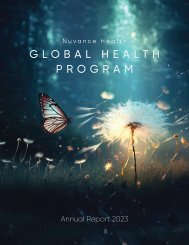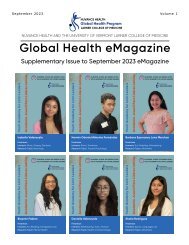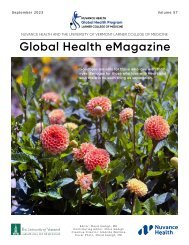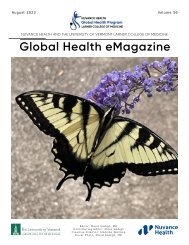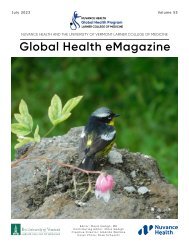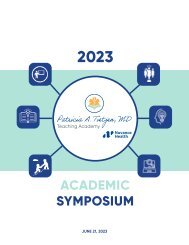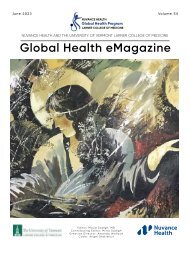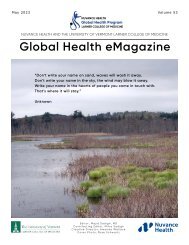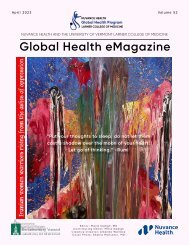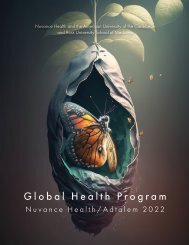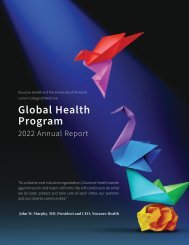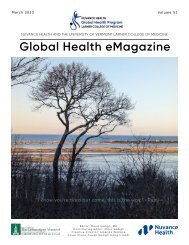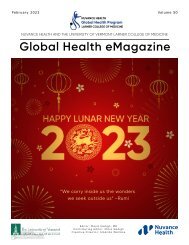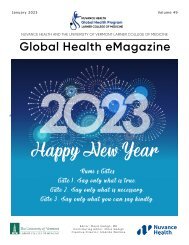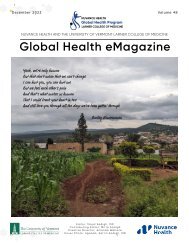April_eMagazine Volume 40
You also want an ePaper? Increase the reach of your titles
YUMPU automatically turns print PDFs into web optimized ePapers that Google loves.
OUR PEOPLE,<br />
OUR MISSION<br />
Global Health<br />
<strong>eMagazine</strong><br />
<strong>April</strong> 2022<br />
Watch this video!!<br />
Bani Adam by Saadi Shirazi<br />
No, a person does not require an education to know that they are being oppressed.<br />
Every human being knows when they are subjected to injustice.<br />
A few students chimed in—to help me, to help this questioning student, to help their own sense of<br />
helplessness. To help our colleagues of color in the virtual room.<br />
The session left me reeling. At first I blamed myself for being unprepared—I should have known<br />
that our national reckoning would seep through the screen. Later, I blamed our education system<br />
for allowing a student to make it so far without a basic understanding of history. I then blamed our<br />
medical education system for allowing a student to enter clinical care without understanding this<br />
continuing history that impacts countless peers, colleagues, and patients. The thought evolved<br />
over the weeks to follow. I harnessed the only thing in this cascade that I could control: ensuring<br />
students completed our global health elective having been exposed to this understanding. The<br />
next cycle, I taught a new course: Colonization and Global Health—a delving into the ways colonization<br />
has and continues to create inequity, and the pervasiveness of the colonial mindset in<br />
today’s global health sphere.<br />
As it turns out, this is not an easy thing to teach. One student’s takeaway was that colonization<br />
was not as successful elsewhere as it was in the United States. Despite grave human rights violations,<br />
it was worth it because the nation is one of the world’s greatest superpowers today. Other<br />
students have begun the course perplexed by the connection between colonization and global<br />
health, and completed it with the two concepts only slightly more reciprocal.<br />
Highlights<br />
Perspectives<br />
Behind the Scenes<br />
Announcements<br />
Spotlight<br />
Reflections<br />
Nursing Division<br />
SARS COV-2 Pandemic<br />
and Us<br />
Clinical Case Report<br />
A New Column<br />
Global Health and the Arts<br />
Articles of the Month<br />
Videos of the Month<br />
Calendar<br />
But the overall response has moved me. Many students feel catharsis in sharing their personal<br />
experiences with colonization. Relief in connecting with others in shared perspectives. Elucidation<br />
in naming the traumas that affect them every day more clearly than before. Awe as they start to<br />
observe their world through a new lens. Shock, even indignation for the false narratives they had<br />
been taught previously—from the media, from teachers, from textbooks, from culture. Guilt and<br />
shame in the reality they didn’t see before. One student applauded my efforts in “sharing truths<br />
that were direct and arguably radical.” I am still sitting with the question of why speaking the truth<br />
is a radical act.<br />
Do people in low-to-middle income countries (LMICs) not know they are getting the short end of<br />
the economic, resource, and life expectancy stick because they are not educated?<br />
Do people in LMIC have lesser access to resources because they’re “not educated” in how to use<br />
those resources?<br />
Do people from high-income countries (HICs) come to LMICs with well-intentioned solutions, but<br />
are misunderstood as having a colonially-rooted savior complex?<br />
Global health experiences on-the-ground are capable of overturning these same fallacies, but<br />
with greater harm to host communities. It is the learning of a student from a HIC at the expense of<br />
a person in a LMIC, much like the students of color that day who were teaching the white student<br />
about the awareness that intrinsically arises within the oppressed.<br />
We cannot provide the breadth and depth of a global health experience in the virtual sphere<br />
any more than we can craft the nuanced, personalized lessons that a student on a global health<br />
elective would be faced with. But we can provide them with a platform on which to question how<br />
inequality came to be before they rush in to help fight it. We can encourage them to investigate<br />
the ways harmful legacies continue to propagate through our subconscious and the systems<br />
from which many of us benefit. We can awaken them to the abuse and mistrust from which global<br />
health emerged and currently inhabits so that they may someday truly connect with the populations<br />
they feel compelled to serve.<br />
“A Radical Act” Mitra Sadigh<br />
Resources<br />
9<br />
Perspectives continued on next page >>




